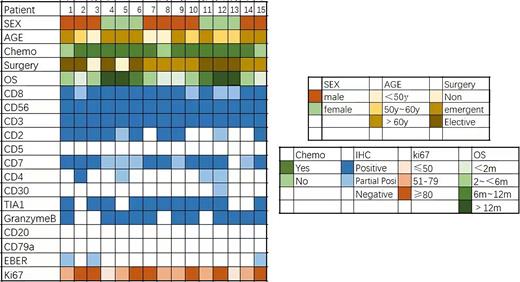Introduction:
Monomorphic Epitheliotropic Intestinal T-Cell Lymphoma (MEITL) is a primary intestinal lymphoma. Previously, it was referred to as Enteropathy Associated T-cell Lymphoma (EATL) type II. However, in the 2016 revision of the WHO classification, MEITL was recognized as a separate entity independent of EATL. EATL is mainly observed in people of Nordic descent and is closely associated with celiac disease, whereas MEITL is more commonly found in Asians and Hispanics without a history of celiac disease. MEITL is an extremely rare condition, accounting for approximately 5% of all Peripheral T-cell Lymphomas (PTCLs). It predominantly affects the small intestine, especially the jejunum. The tumor cells often display an activated cytotoxic T-cell phenotype and express CD8 and CD56. Due to its rarity, there is limited understanding of this disease. Between 2017 and 2022, our center diagnosed only 14 cases of MEITL. We analyzed the clinical characteristics and pathological phenotypes of these patients and further investigated the status of gene somatic mutations using a panel-based genomic exome analysis.
Results:
Clinical features: From the medical records system, a total of 622 gastrointestinal live tissue biopsy samples were searched from October 2017 to September 2022. Among them, 67 cases (10.8%) were diagnosed as PTCLs, with only 15 cases (2.4%) being identified as MEITL, accounting for 22.3% of all gastrointestinal PTCLs. Out of the 15 MEITL cases, 9 were male, and 6 were female, with a median age of 61 years(figure).
Treatment and Efficacy: Seven patients underwent elective surgery due to the involvement of malignant tumors in the gastrointestinal tract, while six patients received emergency surgery for intestinal perforation. Three patients did not undergo chemotherapy, and the remaining 12 patients received a median of 5 (range 1-8) cycles of chemotherapy using the CHOP/CHOP-like regimen. For elderly and frail patients, the dosage was reduced by 20% to 50%. After treatment, one patient achieved complete remission (CR/CRu), three patients had a partial response (PR), six patients had stable disease (SD), and two patients had uncontrolled disease (PD).
Pathological Characteristics: The diagnosis of MEITL was confirmed by two hematopathologists. The immunohistochemical staining results are shown in Figure. The results revealed that all patients expressed CD3, CD8, and CD56. Only four cases expressed CD4, including three cases with partial expression. TIA1 was expressed in 11 patients, and granzyme B was expressed in 11 patients, with eight cases showing co-expression of TIA1 and granzyme B. None of the patients expressed CD20, while one case showed weak expression of CD30. Ki67 expression was observed in all cases, with seven cases having Ki67 expression above 80% and all others showing expression above 50%.
Gene Mutations: We conducted the Next-Generation Sequencing in 12 patients. The genes include STAT5B (9 cases), SETD2 (7 cases), NRAS (3 cases), KRAS (4 cases), JAK3 (4 cases), BRAF (1 case), BCOR (1 case), CREBBP (4 cases), EZH2 (1 case), EP300 (1 case), JAK1 (1 case), TP53 (3 cases), ATM (1 case), SOCS1 (1 case), CHD2 (1 case), and JAK2 (1 case). All patients showed abnormalities in two or more genes.
Survival: Median follow-up time was 4.45 months, and among 15 patients, 14 experienced disease progression. The median progression-free survival (PFS) was 2.9 months (95% CI: 1.7 months to 4.2 months). Up to the follow-up cutoff, 11 patients had died, and the median overall survival (OS) was 4.8 months (95% CI: 3.2 months to 6.4 months). Patients who underwent early elective surgery showed a significant improvement in OS (P=0.012), with a median OS of 18.0 months. Based on gene mutation analysis, mutations in STAT5B and RAS (NRAS or KRAS) (P=0.038, 0.007) were associated with poorer OS, whereas abnormalities in genes like SETD2 did not affect patient OS.
Conclusion: Our results show that MEITL is extremely rare, accounting for only 2.4% of all lymphomas involving the intestines. Patients with MEITL have a poor prognosis, with a median OS of less than six months. However, early elective surgery can significantly improve patient survival. MEITL is characterized by a cytotoxic T-cell phenotype, with the majority expressing TIA1 and granzyme B. Commonly occurring gene mutations are found in STAT5B, SETD2, and NRAS or KRAS. Mutations in STAT5B and RAS genes (NRAS or KRAS) often indicate a shorter OS.
Disclosures
No relevant conflicts of interest to declare.


This feature is available to Subscribers Only
Sign In or Create an Account Close Modal